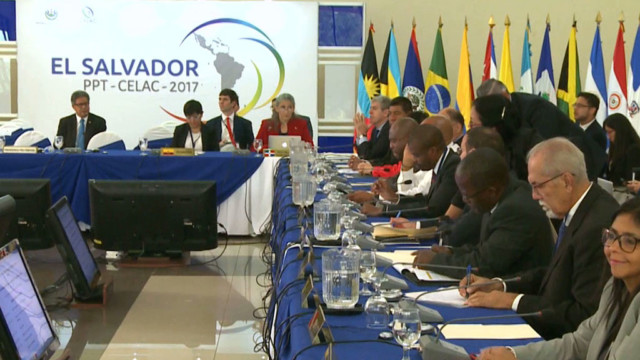The members of the Community of Latin American and Caribbean countries, CELAC, met in El Salvador on Tuesday to discuss Venezuela’s political crisis.
The gathering was called by the Foreign Ministry of Venezuela after it announced last week it was splitting from the Organization of American States.
CGTN’s Nitza Soledad Perez reports.

Seven of the 33 countries that comprise the Latin American bloc were a no-show at this emergency meeting called by Venezuela to address the political and economic crisis in Caracas.
No statements were released on how to move forward because, according to the rules, all members would need to be in attendance.
“CELAC is ruled by consensus. There cannot be a resolution or agreement because seven nations did not show up. All have to be present to have a resolution,” Hugo Martinez, El Salvadoran Foreign Minister said.
Venezuela called for this gathering of CELAC countries after initiating a break up from the Organization of American States.
“We feel good today because we are not under the burden nor are we shameful witnesses to Washington’s pressure. Blackmail and extortion to subdue our Latin American spirit,” Delcy Rodriguez, Venezuelan Foreign Minister said.
Salvador’s president urged participants to “join forces, so Venezuela can soon find the peace and stability it longs for.”
This session comes amid rising tensions some 2500 kilometers away in Venezuela after President Maduro announced his call for sweeping constitutional changes.
Outside the meeting in San Salvador, supporters of Maduro’s government assembled.
And a few kilometers away, opponents showed their disapproval.
“The Venezuelan people are tired and they are showing it. I’m glad to be using this mock meeting of the CELAC because the government wants to talk about democracy, hiding the fact that they are just a minority. The majority is out there, protesting. They are out on the streets,” Esther Mata, Venezuela opposition supporter said.
Discussions will continue in the Dominican Republic in two weeks, but the reality is that CELAC and the OAS lack the tools to enforce any recommendation on the crisis. Still, it’s hoped that through dialogue, the Venezuelan government and the opposition can figure a way out of the political turmoil.
 CGTN America
CGTN America

